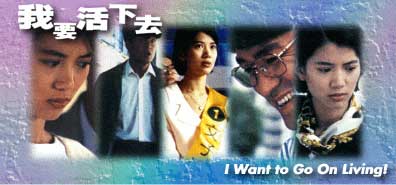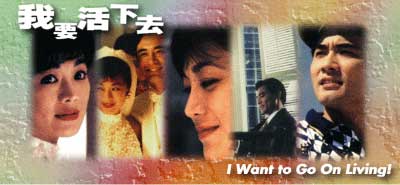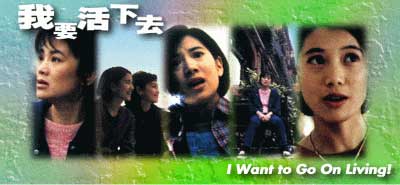

Advance warning: Those who don't wish to read a rant should skip to the next paragraph. For those who have stuck around, this reviewer thanks you for your indulgence! Okay, here goes...There are few things I get more irritated by with regards to Hong Kong movies than bad subtitling: Two of them -- an unsubtitled Cantopop interlude and an untranslated amount of Chinese script at the end -- are to be found in this (otherwise) thoughtful production. My sense is that the words of the song (possibly sung by Anita Yuen, who has a singing career as well as appearing in this offering) complemented the montage of scenes that were on screen for that set period of time. My guess is that the text that appeared on screen before the credits rolled gave some details as to the future of the film's main characters. Perhaps I am making too much of a big deal out of nothing and do already understand what the filmmakers sought to communicate in and via this movie. One must hope so since, otherwise, the rest of this review might be pure bunkum!
There were times when I watched this obviously carefully crafted work that I almost could not believe that I was watching a Hong Kong movie. I WANT TO GO ON LIVING's beautifully filmed opening scenes (one cannot help but notice the interesting camera angles and artful cinematographic compositions, masterly use of light and shadows, intriguing rural scenery and spartanly furnished interiors) and old-style narrative (a grandmother spinning a story about their relatives to her granddaughter) brought to mind the (admittedly few) Mainland Chinese productions I have seen. Some of the domestic intrigue, tight -- yet able – negotiations of limited social space and pragmatic pacts recall historical costume dramas of Western European royalty and nobility (like "Anne of a Thousand Days" and "Dangerous Liaisons"). Then there's the kind of "rags to riches", "individual from the boonies makes good in the metropolis" and "can do" elements plus broad social sweep which contribute so much to the popularity of sagas by contemporary English authors like Barbara Taylor Bradford and R. F. Delderfield.

This (re)viewer also greatly appreciated that virtually everyone – male and female -- who features for more than a few minutes in I WANT TO GO ON LIVING is given complexity and (thus) is neither completely admirable nor contemptible. Though the "I" in this bitter-sweet drama's title clearly is Pui Yan, she clearly is a human figure; who can sometimes be admired for her resilience and initiative but in other circumstances, faulted for her passivity or pragmatism. And one surely will feel some sympathy for the character of Yip Fan even when one is frustrated with many of her actions (Anita Yuen is suitably burdened with woe, plagued with doubt or full of life and hope according to what is called for in her role as Pui Yan's step-daughter).

IMHO, I WANT TO GO ON LIVING is that rare film which treats an emotional story with intelligence and respect. Somewhat like "Hu-Du-Men" (another effort which features a controlled performance by Anita Yuen and a masterful one by a veteran actress), it might seem to lack the requisite noble suffering and sense of victimization on the part of the women that -- from a Western "art house" viewpoint -- certain (undoubtedly culturally-specific) situations might seem to call for (and would have no doubt been portrayed in many more "serious" films). Instead, for better or worse, this 1995 work contains precisely the attributes of "agency", "possibility" and "resistance" in trying conditions that quite a few Post-Structuralist and -Modernist scholars want so much to behold in many contemporary situations. Put in less academic -- and more movie review appropriate! -- terms: If you are looking for a film which is infused with the belief that one can't get everything one wants but one can get more than one may think one ever could, this screen adaptation of a novel (by Leung Fung-Yi) just might be the movie for you!
My rating for this film: 8.5
